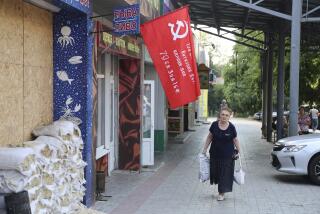Irregularities Prevent Serbs From Voting in E. Slavonia
- Share via
SARAJEVO, Bosnia-Herzegovina — Widespread irregularities prevented many Serbs from voting in national elections in Croatia on Sunday, in a flunked first test of U.S.-backed plans to lead the last rebel enclave in the Balkan country back to Croatian rule.
Voting was so chaotic in Eastern Slavonia, a Serb-held enclave in the eastern corner of Croatia, that U.N. officials first ordered polls to stay open an extra two hours Sunday night and then for nine more hours today.
International monitors had hoped that the Serbs of Eastern Slavonia would feel safe enough to vote in the election as an indication of their willingness to remain in the region and live under a Croatian government. The alternative, they feared, was another dismal exodus of Serbian refugees.
Militant Serbs seized the region and fought with Croatian forces in a 1991 war that left more than 10,000 people dead. The principal city in Eastern Slavonia, Vukovar, was devastated by the Serbian assault and became a symbol for Croats of their wartime suffering.
But in the spirit of peacetime, Croatian authorities had agreed to make it possible for Serbs to vote in the enclave, which is to be restored to Croatian control by the end of the year.
Instead, irregularities stranded thousands of Serbs. Many who had registered to vote found that their names had mysteriously vanished from voter rolls, U.N. officials said. In one case, an entire residential block of people was missing from the lists; several high-ranking Croatian Serb officials whose papers were completely in order--including the de facto mayor of Vukovar--were prevented from casting votes.
Ballots and ballot boxes arrived up to seven hours late at polling stations in Serbian areas; many stations opened late, or election officials simply failed to show up.
International officials cited a “pattern” that they said illustrated the Croatian authorities’ reluctance to allow Serbs to participate and a lack of commitment to democracy. In addition to the logistics questions, the tone of the election campaign has been negative, with some Croatian political parties reviving war images and branding most Serbs as war criminals.
But the Serbs were told to share some of the blame too.
Many Serbs, discouraged by hard-line leaders, waited until the last minute to apply for identification documents. Meanwhile, the Croatian government resisted issuing papers to those who did apply in time. And the 5,000-strong U.N. force in charge of Eastern Slavonia failed to sort out the mess quickly enough.
The difficulties bode ill for what promises to be a tricky and potentially violent re-integration of Eastern Slavonia into Croatia.
“Of course people are upset and discouraged,” said a U.N. official. “These are the first free elections held in this area, possibly ever, and it is unfortunate that this had to happen this way.”
Elections were being held throughout Croatia on Sunday for municipal and legislative posts. An estimated 150,000 Serbs live in Eastern Slavonia, including native-born and refugees.
More to Read
Sign up for Essential California
The most important California stories and recommendations in your inbox every morning.
You may occasionally receive promotional content from the Los Angeles Times.














